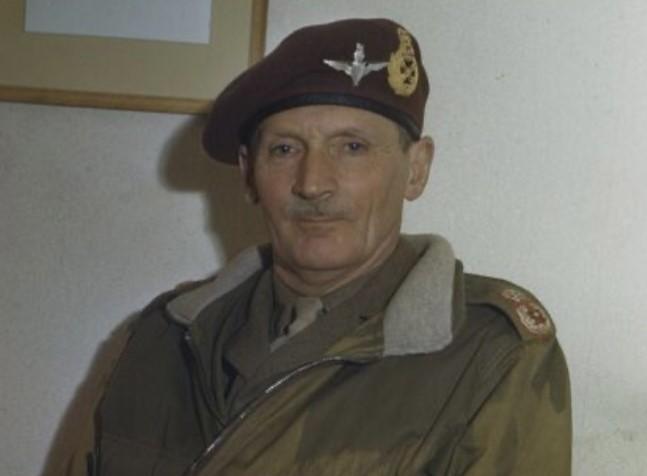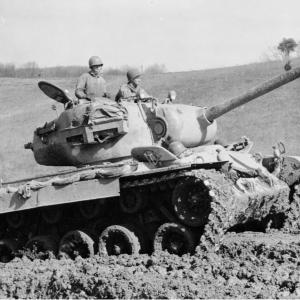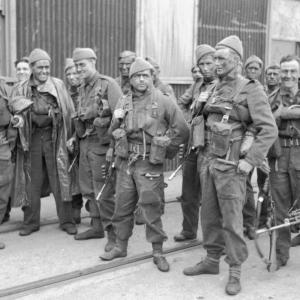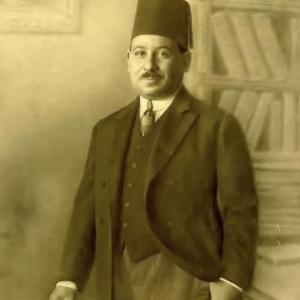
Field Marshal Bernard Law Montgomery
Field Marshal Bernard Law Montgomery, 1st Viscount Montgomery of Alamein KG, GCB, DSO, PC, DL nicknamed "Monty"
Early Life and Military Beginnings
Bernard Law Montgomery was born on November 17, 1887, in London, England. He was the son of an Anglican bishop, Henry Montgomery, and Maud Montgomery. His early life was marked by strict discipline, particularly as his father’s missionary work took the family to Tasmania. Montgomery attended St. Paul's School and later enrolled at the Royal Military Academy Sandhurst, where he graduated in 1908 and was commissioned into the British Army’s Royal Warwickshire Regiment.
Montgomery's military career began during World War I, where he was severely wounded in 1914 during the First Battle of Ypres. He was awarded the Distinguished Service Order (DSO) for his bravery and spent time recovering before returning to the battlefield. His experiences in the trenches shaped his tactical approach in future conflicts, making him a cautious but decisive leader.
World War II: The Rise of a Military Leader
Montgomery’s leadership during World War II solidified his reputation as one of Britain’s greatest generals. At the outbreak of the war, he was involved in the British Expeditionary Force (BEF) in France and played a role in the Dunkirk evacuation in 1940. His first major success came in North Africa, where he was appointed commander of the Eighth Army in 1942.
His most significant victory in the African campaign was the Second Battle of El Alamein (October–November 1942). Recognizing the need for thorough preparation, Montgomery ensured his forces were well-supplied before launching an offensive against German Field Marshal Erwin Rommel’s Afrika Korps. The decisive British victory marked a turning point in the North African campaign, leading to the eventual retreat of Axis forces from the continent.
Montgomery was known for his meticulous planning and insistence on high troop morale. He frequently visited the front lines to interact with soldiers, reinforcing his belief in their capabilities. His ability to inspire and maintain discipline made him a respected leader within the British Army. However, his relationship with American generals, particularly General George S. Patton, was sometimes tense due to Montgomery’s rigid and often condescending manner.
The Italian Campaign and D-Day
Following success in North Africa, Montgomery played a key role in the invasion of Sicily (July 1943) and later in the Italian campaign. His leadership helped push Axis forces northward, though the campaign was characterized by challenging terrain and staunch German resistance. He was frustrated by the slow progress and the divided command structure, which often led to delays in operations.
Montgomery’s most famous contribution came during the D-Day landings on June 6, 1944. As commander of the Allied 21st Army Group, he was responsible for overseeing the British and Canadian landings at Sword, Gold, and Juno beaches. His meticulous planning ensured the success of the landings, and he played a vital role in the subsequent Battle of Normandy, culminating in the liberation of France.
Despite his achievements, Montgomery's leadership style sometimes led to friction with other Allied commanders. His claim that the Normandy campaign had gone exactly as planned was viewed as arrogant by his American counterparts, who had encountered significant resistance during the breakout.
The Battle of the Bulge and Final Victory
In late 1944, Montgomery's forces advanced into Belgium and the Netherlands. When the Germans launched their last major offensive—the Battle of the Bulge (December 1944–January 1945)—Montgomery played a crucial role in stabilizing the front. His forces helped repel the German advance and contributed to the final push into Germany.
Montgomery was present at the German surrender on May 4, 1945, in Lüneburg Heath, where he accepted the unconditional surrender of German forces in northern Germany, Denmark, and the Netherlands. His contributions were widely recognized, and he was promoted to Field Marshal, Britain’s highest military rank.
Post-War Career and Legacy
After World War II, Montgomery served as Chief of the Imperial General Staff (1946–1948), where he worked to modernize the British Army. He later became Deputy Supreme Commander of NATO (1951–1958), playing a significant role in shaping Western European defense strategies during the early Cold War.
Montgomery retired in 1958 but remained active in public life, writing several books on military strategy and his wartime experiences. His memoirs, The Memoirs of Field Marshal Montgomery, published in 1958, provided insight into his leadership style and military philosophy.
Despite his remarkable military successes, Montgomery was a controversial figure due to his rigid personality, outspoken nature, and frequent conflicts with other Allied commanders. His relationship with Winston Churchill was also complex; while Churchill valued Montgomery’s strategic brilliance, he often found him difficult to manage.
He passed away on March 24, 1976, at the age of 88. His impact on military strategy, leadership, and the outcome of World War II remains widely acknowledged. Despite his sometimes controversial personality—marked by arrogance and an abrasive manner—his tactical acumen and ability to inspire his troops secured his place as one of Britain’s greatest military leaders.
Conclusion
Field Marshal Bernard Law Montgomery was a pivotal figure in 20th-century military history. His leadership in North Africa, Europe, and his role in the Allied victory during World War II cemented his reputation as a strategic mastermind. While his personal style may have been divisive, his military successes and contributions to British and Allied forces are undeniable, making him one of the most celebrated military figures in history. His meticulous planning, focus on troop morale, and decisive leadership ensured victories that changed the course of the war, solidifying his legacy as one of Britain’s foremost military commanders.










